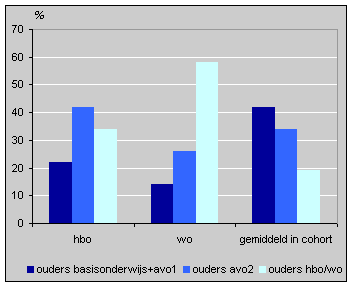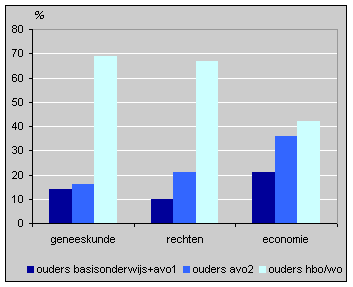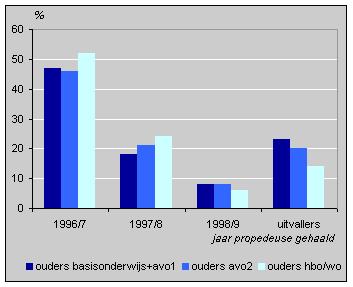Effects of parental education levels on students in higher education

Three out of every five pupils who go on to university after secondary school have parents with higher educational levels. This is also true for one third of pupils who attend vocational colleges.
These figures apply for the cohort of secondary school pupils starting university or vocational college in 1994 or later. These students started secondary school in 1989. One in five of these first formers had parents with a university degree or a vocational college diploma. So the proportion of students at university and vocational college with higher educated parents is much larger than that of pupils in the first year of secondary school.
Vocational college and university students by educational level of highest educated parent (students, cohort 1989)

‘Elite’ disciplines
Medicine and law are the most ‘elite’ disciplines. Two-thirds of medical students come from a background of higher educated parents, one in seven have parents with lower educational levels. For law students, too, two-thirds have parents with a high educational attainment, and only one in ten have parents with lower education.
Relatively many students of economics, on the other hand, have parents with lower educational levels: one in five. Two-fifths of economics students have parents with higher educational levels.
University students by educational level of highest educated parent (students, cohort 1989)

There are relatively many vocational college students with higher educated parents in the health disciplines, and relatively few on agricultural courses. In social sciences and teacher training, on the other hand, many students come from low educational backgrounds.
Slightly better results
Fifty-two per cent of first year university students from higher educational families pass their first year exams, compared with 47% of students with parents who have only primary or first-stage secondary education. In the second year of university, the scores are 24 versus 18%. In the third year again there are more drop-outs among students with parents with lower educational levels.
Results 1996-1998 of students who started university in 1995

The same pattern can be observed for vocational college students. Here too, students with lower educated parents are more likely to drop out.
Christine Jol